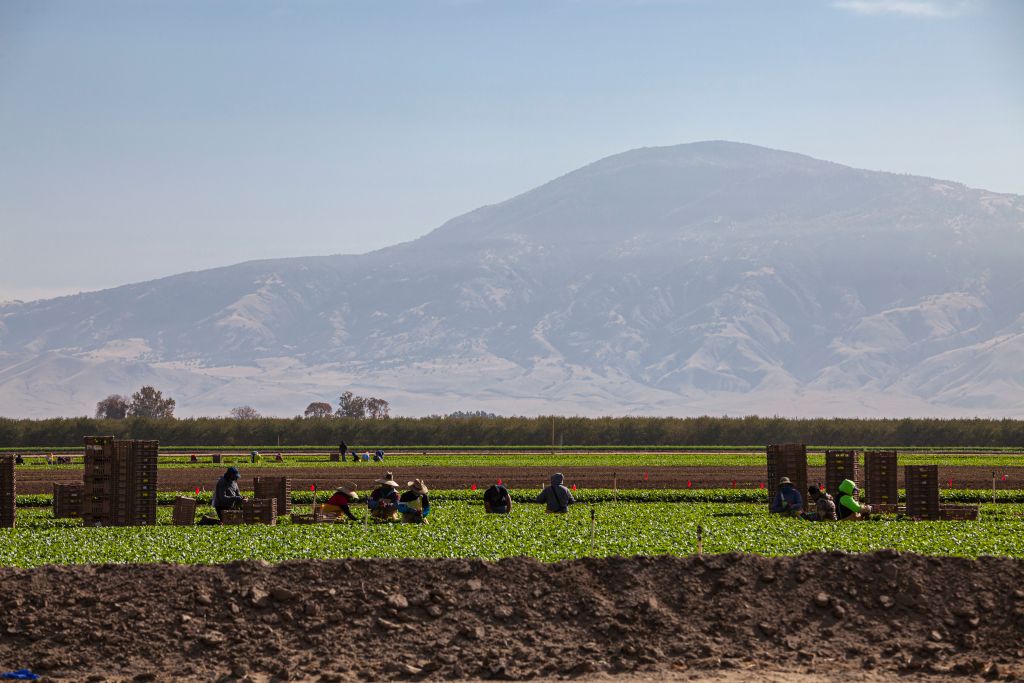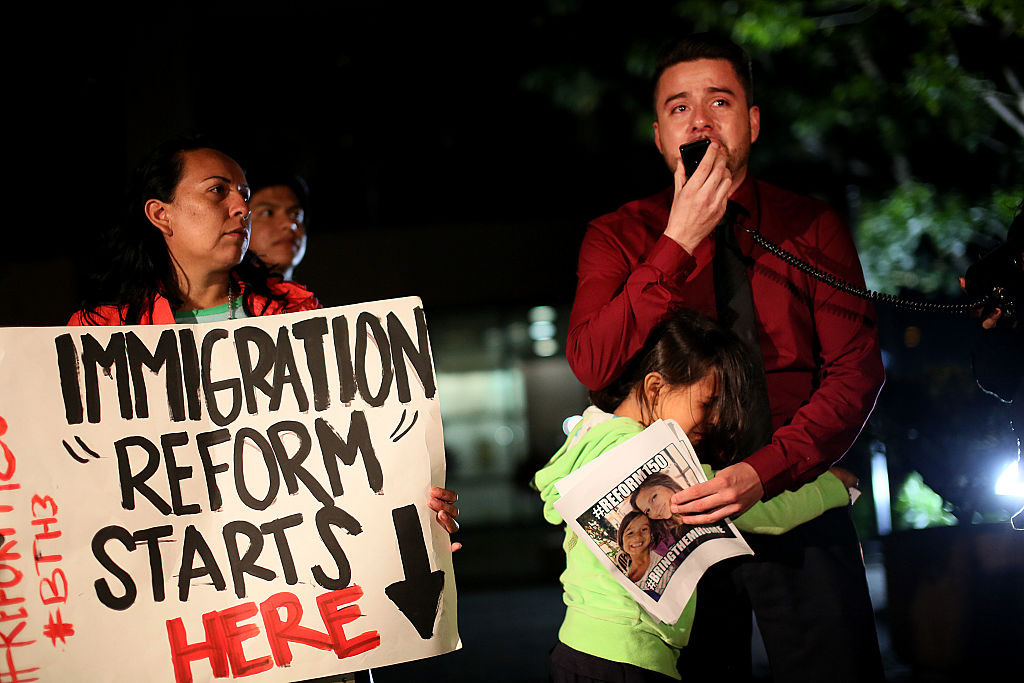LOS ANGELES: When Irma Mejia moved into a garage with her three children, she was hoping it would be temporary. Then, on the very first payday after pandemic lockdowns went into effect, she says her new manager told her she was only going to get paid half of what she was owed.
“[I thought] if you couldn’t pay me, you should have asked me,” Mejia recalls. “Because I get to decide if I’m working here or not, right? If you’re only gonna pay me these hours, then I’m only working those hours.”
Mejia, 45, was stunned. She lived in a garage, but still had a $750 rent check due. She felt helpless. Undocumented, she knew she would have no legal protections in a labor dispute, and believes that played a role in the decision of her manager at a laundromat in Boyle Heights, East Los Angeles, to not pay her full wages.
Mejia says she quit after four months of trying to get paid what she was due. She believes she’s still owed almost half of her total wages, but isn’t sure about the exact amount as she says she wasn’t keeping track during the chaos of the early days of the pandemic. She says she has lost hope of recovering that money.
“My immigration status has been weaponized,” she says.
Over one million of workers in California are undocumented, making up 6% of California’s workforce and contributing $3.7 billion towards the state’s tax revenue, according to a University of California, Merced, report released in March. They also play a crucial part in the labor force, filling one in 16 jobs, especially in manufacturing, food service, construction and agriculture. Yet these workers are not eligible for unemployment benefits, making it more likely that they’ll end up working in exploitative or high-risk environments.

The UC Merced report found that undocumented migrants in California were eligible for $1,700 in state and federal assistance in the first year of the pandemic, compared to $35,000 for residents who were also U.S. citizens. Immigrants made up 58% of pandemic-related deaths in California’s deadliest industries — agriculture, landscaping and food processing — between March and December 2020.
The data is not broken down for undocumented migrants, but activists who work with them say they have been especially vulnerable — particularly women, whose top 10 occupations in the U.S. all involve in-person work, such as cleaning, child care and restaurant work.
“A lot of the inequities that we see generally out in the world are ramped up for that population,” says Sasha Harnden, an attorney at Inner City Law Center in Los Angeles. “They are dealing with mountains of rent debt, having to go back to work, despite potentially having to take care of family members, and have to deal with the loss of a lot of lives, including primary breadwinners [during Covid].”
Providing undocumented people with a pathway to citizenship would be one solution to this problem. But ongoing efforts in the Senate to achieve this before the Republicans take the House stumbled in mid-December over disputes about also increasing funding for Customs and Border Protection at the same time.
In the House, 28 Democrats led by Reps. Lou Correa (D-Calif.), Jesús García (D-Ill.) and Adriano Espaillat (D-N.Y.) called on Senate Majority Leader Charles Schumer (D-N.Y.) and Senate Minority Leader Mitch McConnell (R-Ky.) to move legislation forward on this issue, claiming that providing access to citizenship to undocumented migrants would raise U.S. GDP by $1.7 trillion over 10 years. The House has passed a bill providing a path to citizenship for undocumented people who came to the U.S. as children, known as Dreamers, but supporters have little hope that the Senate will consider it.
‘Honest labor’
Before the laundromat, Mejia worked in different convention centers in Long Beach, Anaheim, and Los Angeles as janitorial staff and also looked after the elderly in a private home. “Honest labor,” she calls it.
When the pandemic hit, she worried about exposing her children and elderly mother by going into work, but the state of her finances left her with no option. Unable to afford childcare, Mejia worked the night shift from 10 p.m. to 9 a.m. at a 24-hour laundromat in East Los Angeles. Her oldest surviving children are in college now, and she wants the younger ones to follow suit. To her, this means not just working to provide for them, but also being present with them during the day. Having to call a garage their home has made this dream feel more distant.
When asked about Mejia’s overdue wages, her former employer, Fresco Laundromat, in a written statement said: “After an internal investigation into the allegations that an employee of our company was dismissed without full compensation for work rendered, we have determined that this event happened under the direct supervision and management of an outside contractor hired to build a night processing team in early 2020.”
They also went on to state that the outside contractor was dismissed from the role in June 2020 for multiple reasons, such as poor performance and lack of communication. The owner, Adam Xavier, added: “The employee never spoke directly to me regarding missing pay. In fact, the reason for her dismissal was not brought to me, as those decisions were handled by the contractor due to a language barrier.”
Xavier says they will reimburse Mejia if she brings her pay slips, but Mejia says the contractor did not give her any to begin with. The Fuller Project and The Guardian have requested the name and contact information of the contractor from Fresco Laundromat several times but have not received a response. Mejia, who did not realize the person who hired her was an outside contractor and not an employee of the laundromat, referred to the person as “the manager” and told The Fuller Project that she cannot recall his name.
Fighting over funding
Twice as many noncitizen workers (38%) live below a “living wage” than citizen workers (18%), according to the same UC Merced study. This has generational implications.
Alejandra “Honey” Arias, a single mother of three daughters, says she was fired from a clothing store in the summer of 2020. She believes her immigration status made it easier for her former employer to fire her. Being undocumented also meant that she was not eligible for unemployment funds.
“I lost my job and I got evicted from where I was living,” she says. “They literally told me to get out. They didn’t care. The landlord did not care. And I got evicted with my three children.
For over a year, Arias shuttled between temporary housing and shelters, trying to make ends meet with the $1,600 she gets from CalFresh food subsidies, as well as $1,600 in Supplemental Security Income cash assistance that she gets for her youngest daughter, who is autistic.
The disparities highlighted by the pandemic prompted some lawmakers to try to take action. State Assemblymember Eduardo Garcia, a Democrat from Coachella, introduced legislation AB 2847 in April to create the Excluded Workers Pilot Program. It aimed to make unemployed undocumented migrants eligible for $300 per week for 20 weeks — a total of $6,000 in assistance.
“Access to unemployment benefits can make all the difference in a family affording rent and food to feed their children,” Garcia said in a written statement to The Fuller Project. “Our immigrant communities are Californians who contribute millions to our unemployment program and economy.”

But California Gov. Gavin Newsom vetoed the bill in September, arguing it needed a dedicated funding source.
“With our state facing lower-than-expected revenues over the first few months of this fiscal year, it is also important to remain disciplined when it comes to spending,” Newsom said when announcing his veto.
Advocates of the bill say the program would have cost $597 million, but Newsom countered that it would cost “well over $20 billion in one-time spending commitments and more than $10 billion in ongoing commitments.”
Struggling to remain resilient
State support can make a bigger difference for undocumented people than most, as their precarious immigration status means problems can easily compound. Arias says she was run over in a hit-and-run accident while crossing the street, and ended up in the hospital, seeking emergency treatment. Friends and family came together to raise almost $20,000 to pay the ER bills for the uninsured Arias, but she says she could not afford to pay for follow-up treatment or physical therapy.
For now, Arias focuses on the day-to-day, helping her two older children with online schooling. Without a car and reliant on temporary housing, she felt her children’s education was being disrupted by having to change schools frequently, and enrolled them in a K-12 program that offers a virtual public school.
Her youngest daughter attends a special education school nearby in Boyle Heights. Like Mejia, Arias values education for her children above all else. She says she dropped out of high school at the age of 15 to help provide for her family and is determined to see that her children don’t share the same fate.
“I needed to help out my mom because my mom was in a really toxic relationship with my father. He was really abusive,” she says. “I didn’t want to be home so I would just go outside to try to bring some money in so there wouldn’t be that much tension at home.”
She recently started a job working as a canvasser for a community organization, and is hopeful this will help her attain the stable and secure housing she craves, a place “where I could feel relaxed.”
“At shelters, you see a lot of things that you shouldn’t,” Arias says. “I do want to protect my children.”
Mejia echoes this sentiment. “A home,” she says, “is where you play, where you eat and where you have conversations.” Without that, she says she feels no control over life.
She reaches up to touch her red, heart-shaped pendant. It contains the ashes of her son, who passed away in 2016, a month shy of his 20th birthday. He was walking down a street with friends when he was caught in an argument between rival gangs and was gunned down.
“I am going to keep fighting,” she says.
CORROBORATION NOTE:
Arias’ story was corroborated by members of Community Power Collective who know her through her mother who organizes with Fideicomiso Comunitario Tierra Libre (FCTL – a local community land trust). They’ve helped her connect with supportive services in the past including temporary shelters.
Mejia’s story was corroborated by members of Inner City Struggle.


 Yusra Farzan
Yusra Farzan
